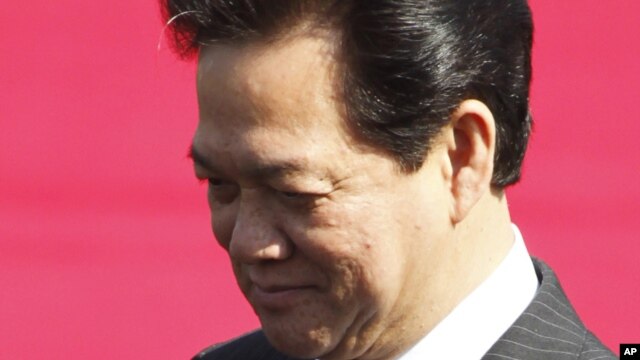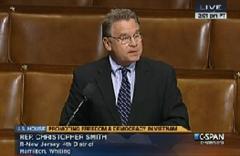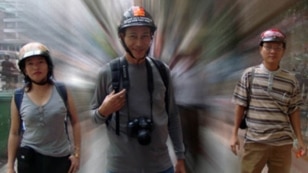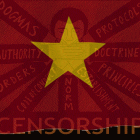In fact, Vietnam’s own economic miracle became legendary, one that the World Bank a few years ago called a “development success story.” In 1986, the year that political and economic reforms were launched, Vietnam was one of the poorest countries in the world with a per capita income below $100. In just 25 years, by the end of 2010, Vietnam was listed as a lower middle-income country with a per capita income of $1,130. The ratio of population to poverty fell from 58% in 1993 to just 14.5% in 2008. And, the country has already attained five of its ten original Millennium Development Goal targets and is well on the way to attaining two more by 2015.
Yet all is not well for Vietnam lately. Corruption and a totalitarian government that still suppresses journalistic freedom, and engages in often-rampant religious persecution that continues to alienate its potential Western allies, particularly the United States (who try as she might simply can’t overlook news of human rights atrocities coming out of that country) plague the nation. In fact, on September 11, the US House passed a bill to protest human rights abuses in Vietnam. Vietnam for her part was quick to respond, rejecting the bill. The Vietnamese Foreign Ministry said that the resolution forged was based on erroneous information and only tended to hinder progress in the normalization of relations between Vietnam and the US, based on openness and mutual respect.
Though Vietnam can likely weather such problems as Hanoi matures and comes to grips with the complexities of international diplomacy in the 21st Century and learns to balance its ambitions while stubbornly holding to still dogged communist ideals at home, it is likely to have more problems dealing with two other more pressing issues: recent financial upheaval resulting in lower GDP projections and energy shortages - both of which can cause Asia’s second economic miracle to sputter, perhaps come to a grinding halt.
Cracks in Vietnam’s economic machine
Economic problems have started to eat away at Vietnam’s fledgling prosperity. In May, Vietnam News Service (VNS) reported that while the Vietnamese economy is showing signs of recovery after monetary and fiscal measures were taken by the government to support business, this year’s targeted GDP growth of 6-6.5 percent would be difficult to reach. Vietnam’s GDP growth is projected to be 4.5-5 percent. Other forecasters project Vietnam’s GDP growth at just 4 percent.
Another problem is inflation. Ironically, Vietnamese businesses try to counter a weakening Vietnamese Dong by using US Dollars, the preferred payment at many hotels, shops and business throughout its larger cities, particularly Ho Chi Minh City (Saigon) and Hanoi.
A World Economic Forum (WEF) report released at the beginning of September reported that Vietnam’s inflation approached 20 percent in 2011, twice the level of 2010, and the country’s sovereign debt rating worsened. Vietnam has plunged ten notches in an annual ranking of its financial and business environment.
The country fell to 75th from 65th a year ago and 59th in 2010, making it the second-lowest ranked among eight of the ten members of the Association of Southeast Asian Nations (ASEAN) covered by the Switzerland-based WEF annual report on global competitiveness. The report also listed corruption as one of the primary culprits in Vietnam’s recent slippage in its poll.
Banking irregularities are also pulling down Vietnam’s economy; to such a degree that news broke in early September about a possible International Monetary Fund (IMF) bail out, rumors the government was quick to put down.
The trouble stems from the fact that many Vietnamese banks made bad loans amid the recent financial crisis. Three weeks ago the Wall Street Journal reported that the Vietnamese government acknowledged that non-performing loans (many made to inefficient state-owned companies) could be as high as 10 percent of the banking system, substantially higher that reported by individual banks. Fitch Ratings analysts think the number is as high as 15 percent.
Gareth Leather, an economist at Capital Economics argues that Vietnam’s economic problems are mostly from its banking sector, and forecasts GDP growth at 5 percent in the coming years. He said that although higher than growth rates in the West, 5 percent is considered slow for a developing Asian country like Vietnam and might not be fast enough to generate sufficient jobs to keep its growing population employed.
Power crunch
Not only is Vietnam’s economy slowing but its energy sector can best be described as problematic. First, Vietnam subsidizes the price that its citizens pay for natural gas. They don’t want to raise the end-user price of gas to a level sufficient enough to guarantee a profit for foreign companies that search for and then have to pay large sums to develop gas reserves.
Also, though this may change as Vietnam’s GDP slips, the country’s electricity demand has accelerated as its economy continues to grow. In the past 15 years, the country’s GDP increased at least 7 percent annually. Electricity demand (in line with economic growth) climbed by 15 percent yearly since the mid-1990s, according to a 2010 World Bank Report.
Since 2007 power shortages and cuts have plagued the country. Conditions worsened in the hot season of 2010 and 2011 when power was cut several times a week, angering citizens and causing heavy losses for businesses.
To meet its growing energy needs, the country has tried to diversify its energy mix while also being aggressive in offshore oil and gas exploration.
The US Energy Information Administration (EIA) estimates that about a third of Vietnam’s energy consumption is from traditional biomass and waste. About 70 percent of the country’s population lives in rural areas and agriculture accounts for a large part of the country’s GDP.
Nearly one quarter of its energy consumption comes from oil, while hydropower is at 10 percent, coal at 20 percent and natural gas at 11 percent.
Vietnam’s oil production has decreased over all since 2004, after several years of steady gains and the country has become a net oil importer since 2011. Vietnam’s natural gas production however has risen rapidly since the late 1990s and is used entirely to supply the domestic market. Though foreign firms are often hesitant to enter Vietnam’s energy sector, TNK-BP has had success there lately.
In April, TNK Vietnam, a subsidiary of Russian oil giant TNK-BP, announced that it had successfully completed the drilling of two development wells in the Lan Do field, just over three months after work started. With an expected annual output of 2 billion cubic meters (bcm), TNK-BP stated that it hopes its new Lan Do offshore field in Vietnam will help to offset nearby field declines as well as helping to meet the country’s growing power demand.
The first gas from Lan Do is projected to flow through the pipeline in the fourth quarter of 2012. TNK-BP expects Lan Do’s annual production to sustain Block 06.1’s current production of 4.7 bcm/y. The field sits 28 kilometers from the Lan Tây offshore platform in the Nam Con Son Basin’s Block 06.1, where TNK-BP is producing gas for power generation in Vietnam.
Some analysts think that this will have a positive impact on the country’s domestic power market, which needs additional fuel sources to meet future demand.
Jamie Taylor, upstream research analyst for Wood Mackenzie, offered a different perspective. Speaking by phone he told Energy Tribune that the development of Lan Do will help offset what he sees as a production decline from the adjacent Lan Tây field rather than result in increased supply from the project.
Taylor mentioned an additional problem with Vietnam’s power sector that often plagues ASEAN member states. “Slow progress in power projects implementation in southern Vietnam has made power shortage inevitable in the region,” he said. “Looking at the current status of power projects, a power deficit is likely to continue for the next few years even if Vietnam speeds up power projects implementation.”
He added that a slower GDP growth in Vietnam will likely reduce the power demand going forward and might lessen the impact of power shortages. If so, it’s a mixed blessing coming amid the country’s recent financial woes.
Chris Faulkner, CEO of the Dallas-based Breitling Oil & Gas Corporation told Energy Tribune that the gas industry has played a prominent role in the fast growth of the Vietnamese economy in recent years, but energy demand has outpaced both the economy and Vietnam’s energy infrastructure.
“Though Vietnam recently transitioned to a free market style economic system, it still lacks the energy infrastructure to provide the stable energy resources that will be key to maintaining an aggressive GDP,” he said.
Faulkner said that Vietnam is at a pivotal point in its domestic energy supplies and policies and that it will not be producing enough natural gas domestically to keep up with demand in the near term, unless new domestic sources are found and developed.
He added that population growth combined with increased demand on natural gas for electricity generation will soon overcome Vietnam’s current reserves and move that country from its current status as a net exporter to the undesirable position of becoming a net importer of natural gas.
“Vietnam will also need to get serious about energy efficiency. A domestic energy policy that addresses energy efficiency, foreign investment, gas exploration, infrastructure development, production, distribution, pricing, and imports is the only pathway to success that I can see for Vietnam to meet surging domestic demand,” Faulkner added.
source: Energy Tribune - By Tim Daiss Oct. 02, 2012
...Read more>>>








.jpg)





